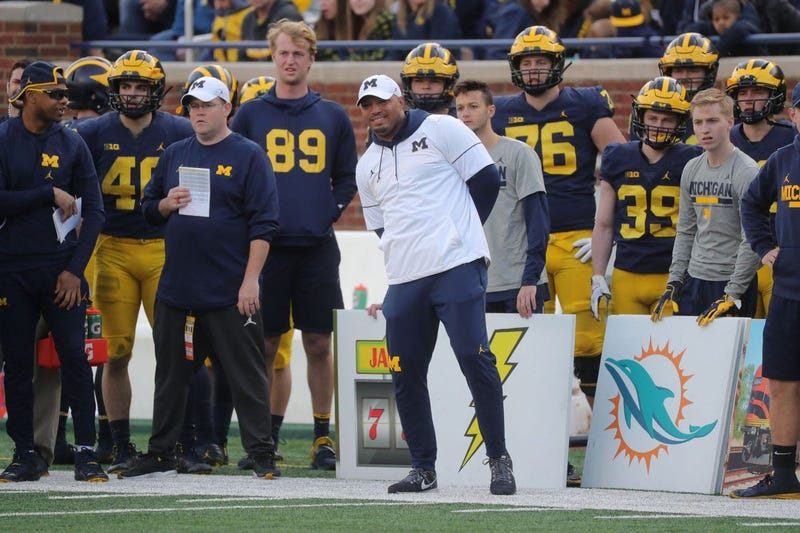
Given the hype that accompanied Josh Gattis' arrival to Michigan last winter, it was easy to forget he had never called plays.
Not at Alabama, where he deferred to co-offensive coordinator Mike Locksley. Not at Penn State or Vanderbilt, where he served as a receivers coach. And at no point in his coaching career before that.
In his first season calling plays at Michigan, whose offense thus far has operated in fits and starts, Gattis is coming to learn just how much the job entails -- and just how deeply it consumes you.
"Each game, each opportunity presents different challenges. I always wanted to be in this position and always dreamed of it, but then you don’t really understand what it takes as far as the emotional part. It’s just, every call lives with you," Gattis told the Jamie and Stoney Show on 97.1 The Ticket. "You go home after the game and watch the game four or five times in a row that night. You just make sure that you go through every call. Did I make the right call? Was it the right situation?
"And there are some calls that I regret on the season, there are some calls I wish I had back, some calls that I could feel better about putting the kids in a better position, because that’s the burden that you take as a play caller. It’s not necessarily, is the play successful, yes or no, but did you do what you could do best to make sure the kids knew everything about that play? Or could you have made a better call in situations, whether it’s fourth down, two-minute? The situational football is probably the most important part of being a play caller."
Jim Harbaugh brought Gattis on board to install a modern pro-spread offense -- in other words, to overhaul the system he inherited. The early returns have been inconsistent. Through four games, Michigan ranks 81st in the country in yards per game (396) and 54th in points per game (32.5), down in both categories from 2018.
"The biggest thing that led to that decision was just being able to support the kids," he said. "Obviously through the first few weeks we faced some tough adversity that we kind of put ourselves in through turnovers, so you feel a little bit disconnected when you’re in the booth because there’s nothing you can say to the guys. There’s nothing you can really do to stop that adversity from happening or being able to change the momentum on the sideline. For me, that’s what it was all about.
"It wasn’t about how I see the game or calling plays. It was more to be the emotional support in good and bad. Celebrate the good plays with them, but then also if any adversity was to strike, being able to pull them through. But it worked out really well. I’m on the field all throughout practice, I call plays in practice on the field, I’ve been on the field my whole coaching career, so it was very natural for me. And I think the kids responded really well to it."
Gattis had a few animated moments on the sideline, like when he got into the face of freshman Giles Jackson after he caught a touchdown from Joe Milton in the fourth quarter. Harbaugh said Monday it was because Jackson ran a different route than the one that was called. For Gattis, those kind of mistakes aren't acceptable, even if the end result is positive.
"I was excited obviously for Joe and Giles, but it was an execution detail with Giles. The thing for us right now is, we’re just not at the point where we can overlook the small, little details that matter on every play," Gattis said. "Regardless of the outcome of the play, whether it’s catches or touchdowns, the little things have to be done correctly. Because as we’ve experienced, when you don’t do the little things correctly, it can cost you.
"I think when you look at the first few weeks for Shea, it’s a combination of everyone helping Shea. I don’t think it ever fell on Shea’s back. It's myself as a play caller helping Shea be more comfortable, it’s the running backs, it’s the offensive line and protection, it’s the receivers. You look at the first few weeks, we probably missed about eight deep shots that were just off the fingertips, multiple players, so it’s everybody. It’s not just one person. It’s speed of route, it’s detail of route, it’s releases, because those little things can create a difference. But I was extremely proud to see him bounce back this week, be the leader that he is, be the type of player that we expect him to be."
